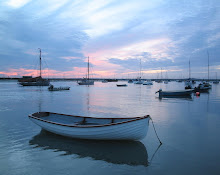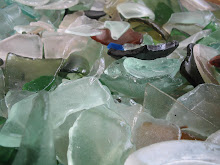 Apologies (but only very perfunctory ones) for two McCall Smith posts in a row, but ...
Apologies (but only very perfunctory ones) for two McCall Smith posts in a row, but ...A recent review of the first book in the No 1 Ladies' Detective Agency series on Vulpes Libris has highlighted yet again the undeniable fact that it is for ever more going to be necessary to qualify any positive views about these books with some kind of disclaimer, acknowledging the fact that 'some people' have found them 'patronising' and/or 'racist'.
I let rip with a lengthy rant on this topic a while ago, by which I still stand, so I won't unleash another one here now, but the constant background hum of these accusations just isn't going to go away. If one genuinely loves these books, does that mean that one is, at some deep-down level, and despite one's very best intentions and self-examinations, complicit in perpetuating a white imperialist view of Africa and Africans?
 Unlike Susan Hill, I don't feel that something has been 'stolen from me' when I read attacks on McCall Smith's Botswana novels, though I agree with her that 'once you know a thing you can never un-know it, though you may forget it'. But the effect of researching the negative criticism was to make me read the most recent book in the series with all my political correctness sensors turned up to full whack and constantly to review my own responses to the characters and plotlines as I went along.
Unlike Susan Hill, I don't feel that something has been 'stolen from me' when I read attacks on McCall Smith's Botswana novels, though I agree with her that 'once you know a thing you can never un-know it, though you may forget it'. But the effect of researching the negative criticism was to make me read the most recent book in the series with all my political correctness sensors turned up to full whack and constantly to review my own responses to the characters and plotlines as I went along.
And I still don't see what's complained of; I really don't.
What does this tell me about myself? That I am right? Or simply that I'm white?
Or that I still haven't delved deeply enough into my cultural conditioning to see clearly enough that I have been hoodwinked?
I guess that for as long as McCall Smith writes these books and millions read them, I and the rest of those millions will either feel a faint underlying unease, or will simply get on and enjoy them regardless.

The issue was complicated by Anthony Minghella's film version, screened on TV earlier this year. A scathing attack on its general niceness, gentleness and leisurely pace by Sam Wollaston in the Guardian ("it's such a pity, when there aren't enough black people on British television, that so many should end up in this saccharine gloop") drew a barrage of favourable comments in its defence, while, more seriously, complaints by some of the extras appearing the film tarnished the books by association.

There's an interesting discussion here, with some well argued views by a black British writer who does find the books patronising bordering on racist.
On the other hand, the review and comments on the film version on Mshairi (poet and administrator of KenyaUnlimited and the African Women's Blog and thus, one might suppose, a reasonably credible source of African women's viewpoints) are much more encouraging:
"I truly enjoyed the movie, especially after the poor offerings from TV land lately. I laughed and cried (etc). Oh the language, the manners, the leisurely pace, the laughter, the beauty and pain. Now that is a good movie. Wasn’t it great to see the real Africa? Not poor, deprived, dying, begging continent. No starving and naked children, but the reality of our lives in Africa."
I'd love this last comment to be enough to allow me to relax and feel OK about my own response to the books, and indeed the film (and its forthcoming sequels). I shall try to let it be. But no doubt the background hum will continue, and come to the fore again from time to time. Sad but true.
But . . . perhaps, ultimately, no bad thing.





















2 comments:
I read these books with huge pleasure and will not let anybody get in the way of that enjoyment. I do not find them racist in any way at all. Now let us see if somebody else leaves a comment and disagrees with me
I think it is fine to read and enjoy these books, in full awareness that they are written by a white man about a country that he loves, spends much time in, but is not "of".
Similarly, I enjoyed the Michael Wells/Stanley book on South Africa published earlier this year (review on Euro Crime), written by two white men.
Another example is Bruno Chief of Police, by Martin Walker, about a small village in the Dordogne, where the author has lived part-time for many years, although is not a native of France or the region.
Because we are not "of" a culture, this does not deny that we can write and read about it. That, to me, is what "education" is really about. As a child, one of my very favourite books was Cannery Row by John Steinbeck. If I read it for the first time now, I would see it as a book about (eg) a group of homeless men living in a pipe and an alcoholic (failed) doctor. But I read it as a 10 year old, and all I reacted to was the joy of the spirit. I loved "Doc" and "Mac and the boys".
Post a Comment